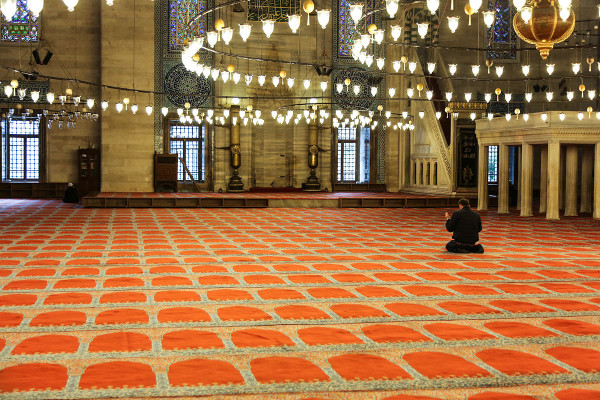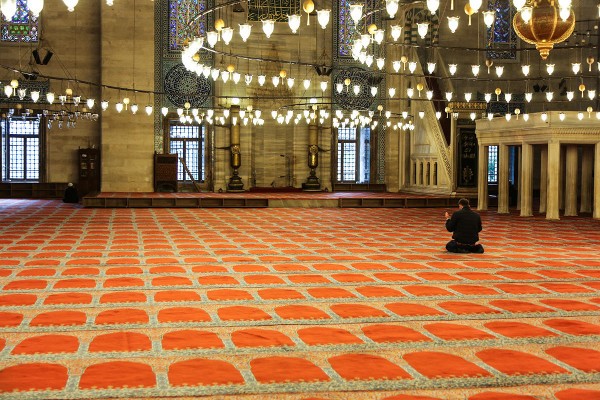
By: Osman Nuri Topbaş
Source: Osman Nuri Topbaş
Prayer, as the most exceptional form of worship, is also the most exceptional form of seeking refuge in Allah. Therefore, when one faces any kind of hardship, trouble, tribulation, suffering, and pain he is supposed to turn to prayer immediately. This is the tradition which the Prophet (pbuh) often put into practice.
Hudhayfa (r.a) said:
“The Prophet used to turn to prayer whenever he faced a difficulty.” (Ahmad, Abu Dawud).
Abu Darda (r.a) said:
“The Prophet used to go into the mosque whenever a storm broke out, and would stay there until it was over. He also used to pray during the eclipse of the moon or the sun.”
We may here elaborate on the eclipse of the moon or the sun. The day when Ibrahim, the son of the Prophet (pbuh), died was a day when the moon was eclipsed. Due to this coincidence some of the companions said:
“– The moon eclipsed on the same day when the son of the Prophet (pbuh) died.”
Yet the Prophet (pbuh) disapproved of this and said:
“Neither the moon nor the sun eclipses upon one’s death!” (Muslim, Kusuf, 29).
On the other hand, the daughter of Abu Bakr (r.a) asked Aisha (r.ha), wife of the Prophet (pbuh), during an eclipse of the sun:
“Is this a sign of rage or doomsday?”
Aisha (r.ha) answered:
“Yes.”
Amr bin As (r.a) narrates as follows:
“The sun had already eclipsed. The Prophet (pbuh) stood up for prayer. He stood so long that we thought he would never bow down. Yet he bowed down, but he again was so long that we thought he would never raise his head again. Then he went down for prostration. Again, we thought he would never raise his head. Yet he raised his head, but he kept his new position so long that we thought he would never go back to the position of prostration. Yet he then went down for prostration. We again thought the same. Yet he raised his head again. And he did the same in the second unit of the prayer. He was crying while prostrating.
Then he appealed to Allah:
‘O my Lord! Have not You assured that You would not punish them when I am among them? Have not You assured that You would not punish them as long as they ask forgiveness from You?’
The eclipse of the sun was over and it was shining again when the Prophet (pbuh) had finished his prayer.” (Nasai, Abu Dawud).
As these accounts display, the eclipse of the sun is not just an ordinary act of nature. It is to remind us of the Divine Grandeur and Power. It is also a Divine Warning and a sign of Doomsday; because having a dark sky suddenly at daytime demonstrates how both the moon and the sun bow down to Allah in accordance with the Divine Order, and also reflects the atmosphere of Doomsday.
Humans are supposed to take warning by the eclipse of the moon and the sun and thereby be wary all the time; and know that everything in this world is passing, and thereby get prepared for the Hereafter; because the eclipse of the sun may not be lifted again.
These kinds of warnings by Allah can be found in other areas. For example, the fault lines on earth are of this kind of warning. Allah can take the lives of His servants without activating the fault lines.
However, He displays them before the eyes of His servants as an example of the inevitable end so that they might be in constant vigilance, and thereby be prepared for the Hereafter. This is, in fact, a warning by Allah. Surely, these are not the only Divine warnings. Floods, hurricanes, incurable illnesses and so on are of this kind. A poet says in this regard:
Death has approached me,
With the excuse of a headache!
However, it must here be emphasized again that if these did not occur, humans would carelessly fall into the claw of death all of a sudden, and perish. Yet, Allah, the Most Merciful, guides His servants through many Divine Manifestations so that they might be prepared for the inevitable realities before the die is cast. Hadrat Nadr narrates:
One day it became dark at daytime. I ran to Anas to ask him:
“Has anything like this occurred at the time of the Prophet? (pbuh)”
He answered:
“Allah forbid! We used to run into the mosques even if the wind blew a little bit faster.”
They used to do so, as prayer is a shield against many calamities and harms in this world, and also a shield against the hellfire. Allah says:
“O you who believe! Seek help with patient perseverance and prayer: for Allah is with those who patiently persevere.” (Baqara 2:153).
The dynasty of Pharaoh in Egypt is a very well-known one in history. It was famous for tyranny and arrogance. It was in power in Egypt at the time of the Prophet Abraham –Aleyhisselâm– as well. The king called Pharaoh used to arrest any beautiful woman who came to his country, and murder her husband (in case she was married), and then ask her brother (in case she had one) to release her to him.
When the Prophet Abraham –Aleyhisselâm– with his wife Sarah left the city of Urfa for Egypt after Nimrod perished, upon crossing the border the Pharaoh’s men asked Abraham –Aleyhisselâm– about the woman accompanying him. Abraham –Aleyhisselâm– told them that she was his sister in religion, hoping to take them in by falling back upon a legal device for getting around the law. Upon his answer they let Abraham –Aleyhisselâm– free, but they took Sarah away to the palace.
It is narrated in Bukhari:
“When Sarah came to the palace, she immediately made ablution and offered two units of prayer. She sought refuge in Allah. And Allah took care of her.”
And the Pharaoh who attempted to approach Sarah was out of breath because Allah was protecting her. And eventually the Pharaoh was paralyzed and alarmed. He finally let Sarah free. Moreover, he gave her his slave Hajar as a gift. The Pharaoh told the high officials of the palace who were bewilderedly watching him:
“– This woman is a jinn. If she were to stay with me a bit longer, I would have perished. I gave her my slave Hajar as a gift not to be harmed by her!”
So, this was a result of the two units of prayer offered by Sarah. Therefore, the Prophet (pbuh) used to direct his household to perform a prayer when faced with any difficulty or calamity, and also read the following verse from the Qur’an:
“Enjoin prayer on your people, and be constant therein. We ask you not to provide sustenance: we provide it for you. But the (fruit of) the Hereafter is for righteousness.” (Taha 20:132).
The Prophet (pbuh) also let us know that the prophets before him also held fast to prayer when faced with any difficulty:
“The former prophets also used to hold on to prayer when faced with any tribulation or misfortune.” (Fadail al-Amal, 249).
The Prophet (pbuh) also said.
“Allah lends help to my people due to the prayers and the sincerity of the underprivileged.”(Nasai, Jihad, 43).
Allama Sharani says:
“A country where people do not offer prayers is afflicted with problems and calamities. And a country where people offer prayers is kept away from them. Let nobody say ‘I offer prayers, and it is not my business if others do not offer prayers’; for when a society is exposed to trouble or calamity it includes all members of it.
The Prophet (pbuh) was once asked about this point as follows:
‘ – Are we to perish even though we have righteous people among us?’
The Prophet (pbuh) answered:
‘ – Yes, when wickedness prevails…’. (Muslim, Fitan, 1)
Therefore, every believer who has been given the inherent power is responsible to enjoin the good and prohibit evil.
On the other hand, the only way of being saved from the weight upon our shoulders through careless acts that draw Divine warning or calamity is to hold fast to prayer. Namely, salvation from sins is possible only by repentance and prayer. The Prophet (pbuh) told a sinful person who came to him and prayed together with him in repentance:
“– Allah has forgiven your sins.” (Muslim, Abu Dawud, Bukhari).




